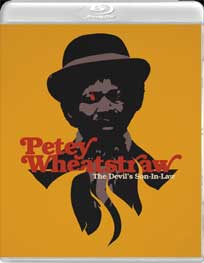 PETEY
WHEATSTRAW (1977) Blu-ray/DVD combo
PETEY
WHEATSTRAW (1977) Blu-ray/DVD comboDirector: Cliff Roquemore
Vinegar Syndrome
 PETEY
WHEATSTRAW (1977) Blu-ray/DVD combo
PETEY
WHEATSTRAW (1977) Blu-ray/DVD comboRudy Ray Moore trades DOLEMITE for "The Devil's Son-in-Law" as PETEY WHEATSTRAW, summoned back from the depths by Vinegar Syndrome on Blu-ray/DVD combo.
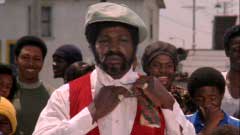
Although born a full grown adolescent boy in the middle of a torrential Miami storm – who gives his father (Sy Richardson, REPO MAN) a beating for "disturbing" him every night while he was in the womb – young Petey Wheatstraw (director's son Clifford Roquemore II) is bullied by the neighborhood kids until wise man Bantu (Brian Breye) teaches him the ancient oriental art of self-defense. Although endowed with the power to kick ass, Petey actually wants to become a comedian. He does so with Bantu's approval but he is warned that his skills will come in handy one day. Years later, successful comedian Petey (Moore) and his "All Girl Tour" come to Los Angeles to perform at Steve's Den (comedian Wildman Steve, THE GUY FROM HARLEM). Unbeknownst to him, rival comedy pair Leroy (Leroy Daniels, AVENGING ANGEL) and Skillet (Ernest Mayhand, RUDE) has planned to take advantage of the off-season when better acts are on the road and have borrowed money from mobster Mr. White (George Mireless) for a large venue. When they cannot convince Petey to postpone his show (having ripped him off they last time they met), they send Scarface Willie (Marvin Jones, PENITENTIARY II) and his men to rough up Steve's employees promoting the show. When promoter Ted's (Ted Clemmons) kid brother Larry (Bryan L. Roquemore) is killed in a scuffle with the Willie, he decides to finish the job by opening fire on the funeral. A bullet-riddled Petey wakes up in Hell where the Devil Loucipher (G. Tito Shaw) offers him the opportunity to take revenge on Leroy and Skillet in exchange for marrying his daughter and producing an heir (Petey did boast in his monologue that he could sit on a tombstone and produced baby ghosts). Petey accepts the deal and is brought back to life along with Ted, partner Jimmy (Jimmy Lynch, SHAOLIN DOLEMITE), and girlfriend Nell (Ebony Wright, SOUNDER PART 2). With the help of the Devil's magic cane, Petey unleashes CARRIE-esque telekinetic fury on his enemies, but then Petey must figure out how to trick the Devil out of collecting his due.
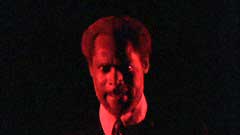 A
little more focused in its plotting than HUMAN TORNADO (which got its verve
out of its willingness to throw everything at the screen and see what stuck),
PETEY WHEATSTRAW like DOLEMITE again takes its basis in an African American
folk hero story for which Moore penned a monologue (the script itself was by
HUMAN TORNADO director Cliff Roquemore). Like Dolemite, Petey gets by more often
than not by the skin of his teeth. Petey is no Daniel Webster and the film had
a comical turn on the sort of shock twist ending that would de rigueur just
a year or so later in horror films. Regular Moore collaborator Lady Reed (DOLEMITE)
appears briefly organizing acts for Leroy and Skillet, as does HUMAN TORNADO's
racist sheriff J.B. Baron early on as the doctor who delivers Petey, but even
the actors here who never made another film all turn in passable performances.
Although Moore contributes a couple toasts and comic routines, the score and
theme song this time around are the work of arranger Nat Dove and vocalist Mary
Love.
A
little more focused in its plotting than HUMAN TORNADO (which got its verve
out of its willingness to throw everything at the screen and see what stuck),
PETEY WHEATSTRAW like DOLEMITE again takes its basis in an African American
folk hero story for which Moore penned a monologue (the script itself was by
HUMAN TORNADO director Cliff Roquemore). Like Dolemite, Petey gets by more often
than not by the skin of his teeth. Petey is no Daniel Webster and the film had
a comical turn on the sort of shock twist ending that would de rigueur just
a year or so later in horror films. Regular Moore collaborator Lady Reed (DOLEMITE)
appears briefly organizing acts for Leroy and Skillet, as does HUMAN TORNADO's
racist sheriff J.B. Baron early on as the doctor who delivers Petey, but even
the actors here who never made another film all turn in passable performances.
Although Moore contributes a couple toasts and comic routines, the score and
theme song this time around are the work of arranger Nat Dove and vocalist Mary
Love.
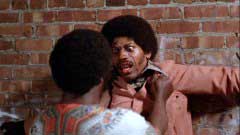
Released theatrically by Generation International Pictures (seemingly their only release), PETEY WHEATSTRAW was released on VHS by Active Home Video in 1986 as THE DEVIL'S SON-IN-LAW and again on VHS by Xenon in 1993 and on DVD in 1999. Scanned and restored in 2K from the original camera negative, the 1080p24 MPEG-4 AVC 1.85:1 widescreen Blu-ray transfer is a large improvement on THE HUMAN TORNADO which had to resort to 35mm prints because of Dimension Pictures' bankruptcy, as well as DOLEMITE by virtue of being a better-photographed film looking quite gorgeous when the photography is at its slickest. The infernal reds of the wardrobe and gel lighting of Hell, the redressed Hotel Dunbar décor glimmers in Nicholas Josef Von Sternberg's (DOLEMITE) attractive but hasty lighting, and night exteriors look clearer than the old Xenon transfer. Moore's romp through the city with the Devil's cane late in the film looks softer, but that is the result of shooting the scene with a telephoto lens as Moore comes into crisp focus when he nearly crashes into the camera. The DTS-HD Master Audio 1.0 track sound fine in terms of dialogue and music with a little residual hiss (which may have originated in the original sound re-recording mixing). Optional English SDH subtitles cover the dialogue, Petey's karate gibberish, and song lyrics.
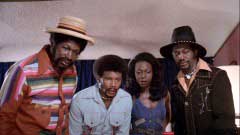
Rudy Ray Moore biographer Mark Jason Murray is on hand for another audio commentary, this time with contributions from co-star/set designer Lynch and archival closing comments by writer/director Roquemore. Murray traces the Petey Wheatstraw character to Moore's comedic routine character and back to blues musician Peetie Wheatstraw (although Moore in the featurette suggests that the character name goes back further into folklore) and discusses both the formulaic elements of the film as well as the its departures. Lynch discusses his threadbare set building methods and the props and furnishings left over in the hotel's various rooms. Besides Roquemore's recorded remarks, constructing and shooting effects sequences with Von Sternberg, and the possibility that he has less to do onscreen here because he was getting better known than Moore as a comic. Murray also relates some anecdotes and factoids from his own conversations with the late director – who was proud of the film because he wrote it as well – and Moore (including the former's hatred of the Roquemore's watermelon jokes in the film). Although some of the actors never made another film, or only made a couple more, Murray and Lynch tell us when they can what else they did or are still doing (including Leroy and Skillet's collaborations with LaWanda Page after some appearances on SANFORD AND SON and make-up artist Marie Carter who went on to more prominent credits).
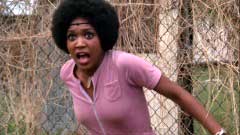
"I, DOLEMITE Part III: Petey Wheatstraw" (18:08) features contributions of Murray, Lynch, Roquemore's sons Rokki (Cliff Jr.) and Bryan, Von Sternberg, co-editor Jack Tucker (who followed this up as part of the editing teams of the epic TV miniseries SHOGUN and THE WINDS OF WAR), and producer Burt Steiger (VICIOUS LIPS). Lynch reiterates his remarks on the special effects and redressing the Hotel Dunbar locations while Tucker describes the film as a learning experience for working with directors breathing down his neck and warmly recalls his friendship with Roquemore while working on a twenty-four hour editing schedule and no access to a script. Roquemore's sons recall their work on the film, bringing their friends in Detroit to see the film when it played there, and standing in front of the theater after the film hoping to be recognized. As with the earlier films, PETEY WHEATSTRAW was produced by Theodore Toney, but delinquent lab bills lead to Pacific Film Labs' Burt Steiger purchasing an interest in the film (as he did with a couple other low budget films of this period), and he appears on screen here to iterate that piece of trivia. With so many contributors, Murray's narrative contribution to the featurette is not so prominent. He starts off stating that he feels Moore should have stuck to the Dolemite character and formula but does not provide any criticisms of PETEY WHEATSTRAW's differences while the amount of archival video footage he has of Moore regarding this title seems to be far less than on the other films.
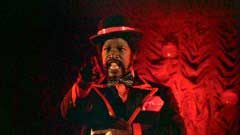 The
shooting locations (8:53) featurette presents shots from the film with the locations
as they exist now, some no longer remotely as they were while others like the
Hotel Dunbar look much improved with renovation. A short still gallery (1:00)
is also included. While the soundtrack option for HUMAN TORNADO had individually
numbered chapters, the individual cues here are lumped into one chapter (34:38).
The disc also includes trailers for DISCO GODFATHER, THE HUMAN TORNADO, and
DOLEMITE (apparently there is no trailer for PETEY WHEATSTRAW) as well as a
reversible cover. (Eric
Cotenas)
The
shooting locations (8:53) featurette presents shots from the film with the locations
as they exist now, some no longer remotely as they were while others like the
Hotel Dunbar look much improved with renovation. A short still gallery (1:00)
is also included. While the soundtrack option for HUMAN TORNADO had individually
numbered chapters, the individual cues here are lumped into one chapter (34:38).
The disc also includes trailers for DISCO GODFATHER, THE HUMAN TORNADO, and
DOLEMITE (apparently there is no trailer for PETEY WHEATSTRAW) as well as a
reversible cover. (Eric
Cotenas)